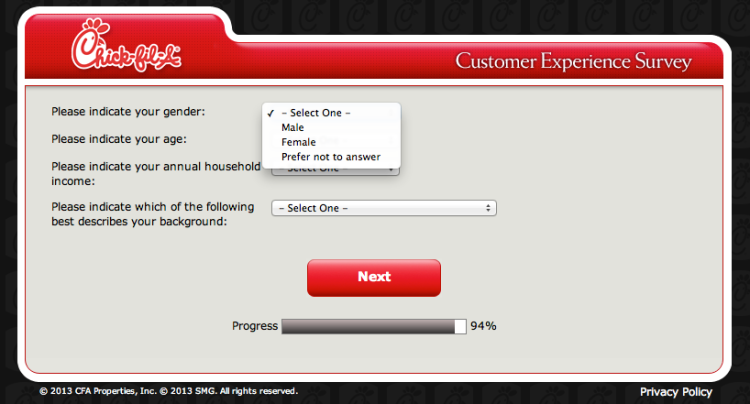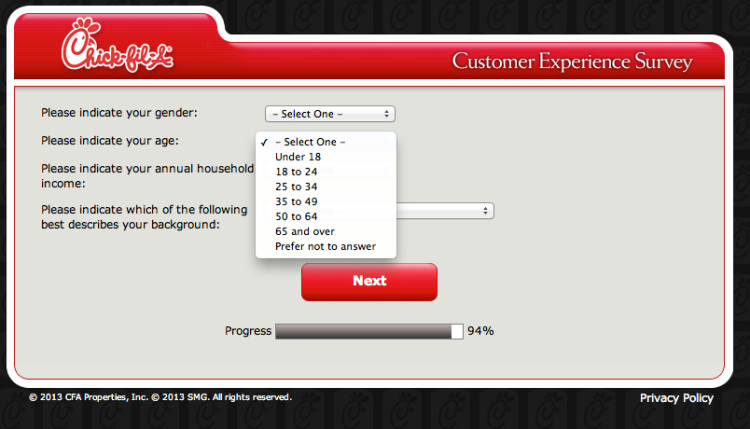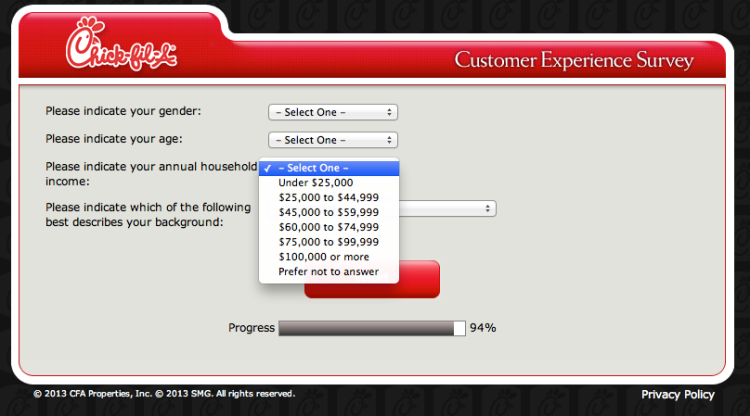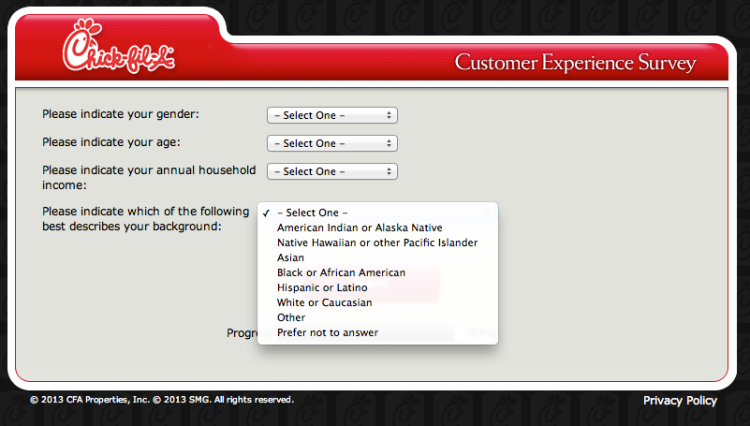What’s the boundary between reasonableness, political correctness, and correctness and wrongness? I am specifically wondering about the language related to demographics on all the surveys we have to complete. (Everywhere you go now there is a survey to take on the computer!) This posting is somewhat experimental. I pose many different questions. I am hoping your comments will help flesh out some of my ideas since these general questions and thoughts have been on my mind for a few months.
Take a look at these demographic questions asked at the end of Chick-fil-A’s online survey. Look at how they are worded and the possible selections.

Gender, of course, is a social construction. As historically practiced in so-called Western societies, this binary only allows for two possibilities. A better question would say: “please indicate your sex.” Even this would encounter problems from a biological perspective. As with gender or anything else in this world, sex, when examined closely, does not neatly fit into human-made dichotomies. Some scientist say there are as many sexes as there are humans, others say we are all “defective females” to infinitely varying degrees, for example. They do get credit on all of the questions for having “prefer not to answer” as an option.

The age clusters are particularly odd to me, especially the “under 18” and “65 and over.” 13 seems to be the magical age when children can “legally” use the Internet, so I wonder why it doesn’t say “13 to 17” or something similar? Also, considering how long people are living, why lump every one from 65 to 90+ in one category? Such lumping is not at all supported by human growth and development theories. Questions like this are also odd in that they inadvertently suggest that someone is vastly different at 35 (the 35-49 age range) than at 34 (the 25-34 age range). A better question would simply be: “please indicate your age” and a box to type it.

Again, the choices are problematic. How many families make below $15K or $10K these days? In some areas, way too many! Such a “high” low threshold of $25K and a “low” high threshold of $100K tends to possibly unconsciously suggest that economic inequalities are better than they really are. (BTW, be sure to see this video about wealth inequality if you haven’t already.)

Ah, the “race/ethnicity” question that tries to disguise itself! A more effective question might be something like: “How does society justify how it marginalizes you?” (joking). Seriously, though, the other questions make it clear what the possible choices will be. A question about “background” could be looking for any number of possible backgrounds. Like with age, sex/gender, and income, there are no hard and fast lines between these different choices of “background.” Additionally, such a loaded question perpetuates the idea among the general public that “race” is real. Using terms as they are popularly used (because none of it makes any sense at a biological and deep historical level), individuals of more than one ethnic backgrounds–such as a child with an Asian mom and a Hispanic dad–are forced to privilege one aspect of his/her ancestry over another. These decisions may seem small to people racialized as white, but it is a serious issue.
As I collectively examine these questions and possible answers in Chick-fil-A’s survey, I keep wondering: what possible purpose does this data serve? is it actually used for that purpose? is it used at all? If Chick-fil-A (and all the companies with similar questions on their own survey) truly intends to use this data to improve customer service and to target any particular pattern of discrimination some important and easy changes should be made (in my opinion). But is the data from these questions even needed? In 2006, as a college sophomore, I did an extended survey looking at student’s leisure time habits. I was advised that unless it is specifically needed for a specific purpose, there is no need to ask about age, race, etc. For scholars such categories are often important for all kinds of reasons, but do they need to be part of everything? Does having a question about race, disguised as a background question, erect unnecessary walls between people?
So be sure to consider the hidden and not-so-hidden powers and layers of meaning behind everyday demographic questions. Words are always deeply imbedded in culture and full of possibly meanings, meanings that will differ person-to-person, and are always fair game for analysis.
Please send comments and thoughts, as always. Just don’t say, “you’re thinking too hard, AJP!” 🙂